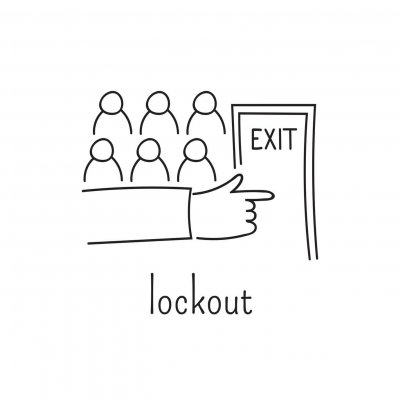 Traditionally, employers and workers have had conflicts throughout history. As a general rule, the conflict focuses on salary issues and the working conditions of the workers. Some of these potentially conflictive elements generate tension and lead to the closure of the company, also called employer lockout, an expression that comes from lockout in English, which literally means "to leave out".
Traditionally, employers and workers have had conflicts throughout history. As a general rule, the conflict focuses on salary issues and the working conditions of the workers. Some of these potentially conflictive elements generate tension and lead to the closure of the company, also called employer lockout, an expression that comes from lockout in English, which literally means "to leave out".
A lockout occurs when a company decides to stop the activity to end a conflict. This closure can be temporary or permanent. In the labor legislation of most countries the possibility of lockout is contemplated.
However, this measure must be carried out in compliance with a series of requirements:
1) the closure must be carried out as a defensive measure against pressure from workers and never as an offensive measure,
2) the closure may only occur under specific circumstances, such as the threat of a violent situation, an illegal occupation of jobs or some type of serious irregularity that prevents the proper functioning of the company.
The purpose of these types of restrictions is to avoid possible abuses by employers, who could resort to lockouts to avoid their responsibilities.
As a general rule, the employer lockout is a measure that is adopted to weaken solidarity among workers.
Consequences of the employer lockout
If the closure complies with the established legal requirements, this situation will produce a series of consequences:
1) workers will stop receiving their salary during the period of time of the employer lockout,
2) the contracts will be suspended and
3) the contributions of workers to social security will be canceled. As is logical, if a judge dictates that the closure is illegal, none of the indicated measures will be implemented and, therefore, the company will be forced to continue with the activity normally.
How do you solve a labor dispute such as an employer lockout?
 The lockout hurts the company and the workers. For this reason, both parties want to return to normal work. As a general rule, two social agents intervene in this type of conflict: the unions on behalf of the workers and the employer as the company's representative.
The lockout hurts the company and the workers. For this reason, both parties want to return to normal work. As a general rule, two social agents intervene in this type of conflict: the unions on behalf of the workers and the employer as the company's representative.
Both parties must discuss and agree on new working conditions so that the company can restart its activity. At times, in these negotiations, the state may intervene as an arbitrator to facilitate the reaching of a new agreement.
Photos: Fotolia - Julia_khimich / AlanAH









